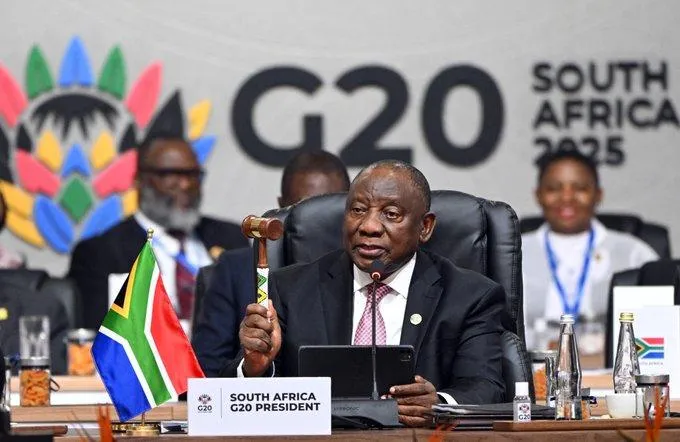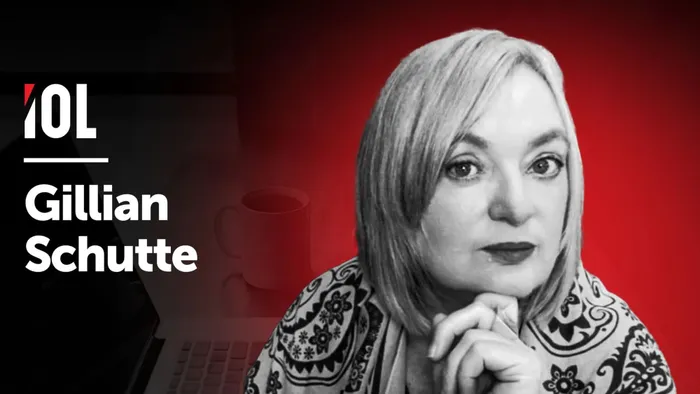The G20, BRICS and the Quiet Auction of South Africa

President Cyril Ramaphosa raising the G20 presidency gavel at the closing ceremony in Johannesburg on Sunday.
Image: African Union / X
After the G20 weekend, social media was saturated with confident declarations about South Africa’s performance on the global stage. One influencer summed up the sentiment circulating across mainstream platforms:
“A good job done. Now the government must get back to the real business of making South Africa work — sustainable economic development, sovereignty, land return, fundamental economic transformation and decolonisation. Let’s not forget we are the most unequal society in the world, with the highest youth unemployment.”
The phrasing carried political flair but lacked the substance required to interpret such an event. Each term was offered as a slogan detached from the country’s structural realities. Concepts such as development, sovereignty, transformation and land return appeared as decorative though clashing gestures, repeated for effect rather than insight. This is now a familiar problem in South Africa’s public discourse. Influencers wield cultural prominence but often speak without the theoretical grounding necessary to understand how global power operates. Their optimism functions as a salve. It sedates the audience while obscuring the deeper logic of South Africa’s economic position.
Understanding why these celebratory statements are misleading requires attention to what actually happened at the G20.
The G20 as an Instrument of Economic Discipline
The G20 is presented as a forum of cooperation among the world’s major economies. Yet its core function is the consolidation of a global financial architecture that secures Western industrial and geopolitical interests. Its communiqués use terms such as stability, confidence, open markets and macroeconomic discipline. These are not neutral concepts. They mandate policy directions that bind developing countries to economic models that serve multinational capital.
Across meetings and ministerial sessions, South Africa faced pressure to accelerate decarbonisation according to timelines aligned with European energy concerns rather than domestic capacity; adopt blended finance systems that protect private capital while placing risk on the public; expand carbon-credit markets that convert ecosystems into global financial instruments; deepen partnerships that shift strategic infrastructure into private control; and adopt digital standards designed by US and EU technology sectors. Fiscal consolidation was reinforced despite evidence that austerity worsens unemployment and reduces state capacity.
These pressures were presented through technical dialogue and diplomatic phrasing. Their substance remained clear. They narrowed South Africa’s policy space, entrenched foreign ownership of technological infrastructure and placed long-term economic strategy under the oversight of global institutions rather than democratic mandate.
The Side Agreements: Where the Real Negotiations Occurred
The official summit stage created the image of national participation, but the consequential decisions were made in bilateral and ministerial sessions.
Climate finance commitments remained tied to loan-heavy instruments administered by Western financial institutions. This creates long-term oversight of the country’s energy transition and multiplies the debt burden. Hydrogen and critical mineral partnerships were advanced by the EU, Germany and Japan, targeting South Africa’s strategic minerals with limited commitments to domestic beneficiation or state ownership. Digital infrastructure discussions promoted American data governance frameworks, shaping cloud systems and cyber architecture in ways that weaken digital sovereignty. Maritime decarbonisation proposals entrenched Northern control over shipping corridors while pushing compliance costs onto Southern ports. Fiscal policy meetings reaffirmed alignment with IMF expectations, signalling that deviation from fiscal tightening would be punished through ratings pressure.
None of this entered influencer commentary. These details require careful analysis and historical understanding. Instead, public discourse focused on optics, reinforcing a narrative of success.
Professor Isaac Shai expressed the gravity of the situation with clarity and precision:
“Theory is important. If you are theoretically shaky, you end up celebrating the source of your oppression and demise. I am worried about anyone who celebrates what happened last weekend as a job well done. There is this misguided jingoism roaming around and it’s sad that people do not even realise that the country was being auctioned the entire weekend.”
This is an accurate reading of the structures at work.
BRICS Inside the G20: Presence Without Strategy
Many South Africans imagine BRICS as a protective political force capable of countering Western dominance. The G20 demonstrated the limits of this assumption.
India strengthened its strategic alignment with the United States. Brazil continued its balancing strategy, prioritising agricultural access and investment. Russia’s influence was limited by sanctions. China advocated for multipolar reforms but operated independently rather than coordinating a collective position. South Africa, constrained by economic dependency, aligned itself with donor-oriented climate and finance models rather than articulating a coordinated BRICS stance.
The bloc appeared as five separate actors rather than a unified formation. It offered presence but not collective leverage. It did not challenge the G7-defined agenda.
Influencers as Agents of Deradicalisation
Influencers shape public sentiment in ways that flatten political complexity. They reproduce donor language and corporate development rhetoric. They transform structural inequality into an emotional device rather than a material analysis. They speak of sovereignty without recognising that sovereignty cannot exist without economic ownership of land, minerals, energy, data and finance. They turn decolonisation into a performative aesthetic.
This form of commentary weakens political understanding. It teaches the public to interpret global events as symbolic victories rather than as negotiations shaped by unequal power. It encourages applause rather than critique. It replaces structural analysis with aspirational language. It conditions citizens to accept foreign policy decisions without scrutiny.
A Clearer Assessment of South Africa’s Position
South Africa enters global forums with longstanding structural constraints: land dispossession, mineral extraction dominated by multinational interests, policy limitations imposed through global lenders, an import-heavy economy, collapsing state capacity and catastrophic youth unemployment. These realities are not addressed through G20 participation. They are reinforced by it.
The summit projected national involvement. The closed-door agreements deepened dependency. BRICS functioned without unity. Influencers declared success while the country’s future was negotiated under externally defined terms.
South Africa requires a politically literate public capable of reading global power with precision. Without this, the country remains in the position described by the Black Consciousness thinker: celebrating processes that entrench its own containment.
This moment demands clarity, not curated optimism. Only through critical understanding can sovereignty regain meaning and transformation evolve from rhetoric into a substantive political project.

After the G20 weekend, social media buzzed with claims of South Africa's success on the global stage. But what lies beneath the surface of these declarations? Gillian Schutte delves into the realities of South Africa's economic position and the implications of its participation in the G20.
Image: IOL
* Gillian Schutte is a South African writer, filmmaker, poet, and uncompromising social justice activist. Founder of Media for Justice and co-owner of handHeld Films, she is recognised for hard-hitting documentaries and incisive opinion pieces that dismantle whiteness, neoliberal capitalism, and imperial power.
** The views expressed do not necessarily reflect the views of IOL or Independent Media.
Related Topics: